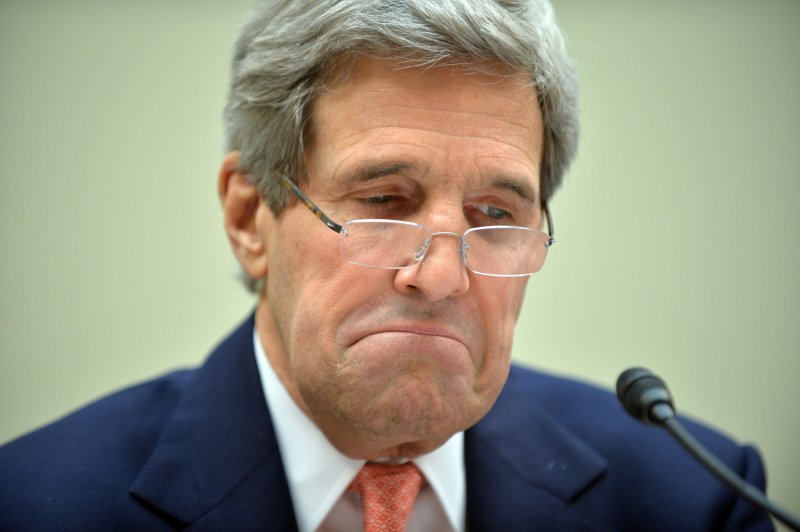Secretary of State John Kerry testifies during a House Foreign Affairs Committee hearing on President Obama’s FY 2015 foreign affairs budget request, March 13, 2014 in Washington, D.C. UPI/Kevin Dietsch. |
License Photo
It has been a long time since an American Secretary of State negotiated under someone else’s gun. Usually the finger on the trigger has belonged to the United States.
Welcome to the new world. Saturday night President Barack Obama had a phone call with Russia’s Vladimir Putin. Sunday Secretary of State John Kerry turned his aircraft around at a refueling stop in Ireland and headed for Paris for new talks with his Russian counterpart, Sergei Lavrov.
The reason for Kerry’s change in travel plans was the presence of 40,000 Russian troops on the Ukraine border. American satellites had seen them being refueled and fed in place, sparking fears among NATO intelligence sources (who seem remarkably thin on the ground) that they were preparing to invade.
For days, pro-Russian demonstrators in eastern Ukraine have been agitating for more autonomy, closer ties to Russia and even for re-incorporation into the Russian homeland. Putin in Moscow has been sounding the familiar alarm about threats of anti-Russian pogroms against his hapless fellow-countrymen.
To the historically minded, or perhaps to the suspicious, this sounds like something out of the 1930s, when Hitler paved the way for aggression by bemoaning the fate of the downtrodden German minority in the Saarland, or in Czechoslovakia, or in Danzig as a prelude to invasion.
To the modern-day appeasers, who say Putin is genuinely concerned for the fate of ethnic Russians, or that the new Ukraine governing group includes some unpleasantly fascist-sounding nationalists, or that Crimea was really Russian all along, the analogy of the 1930s is a pitiful and naïve re-interpretation of history. Putin talks big but in reality runs a country and an economy too weak to match his ambitions. His appetite, the appeasers maintain, will be soon be satisfied with Crimea, or eastern Ukraine, or -- who knows.
Meanwhile, the world watches with interest and does not care in the least about parallels with the 1930s. It sees only that President Obama talks tough but seldom seems to act accordingly.
And they see that Putin’s Russia has already invaded Georgia, and got away with it.
He has invaded Crimea, and got away with it.
He has battered Estonia with a brisk dose of cyber-war, and got away with it.
And now Putin is wielding his verbal saber again over eastern Ukraine, with armored and motorized infantry divisions on the border to back him up.
And the United States has done nothing serious to shore up the NATO alliance, other than Obama’s always impressive oratory. It has done nothing to demonstrate that Europe need not fear Putin’s energy weapon, nothing beyond some token air patrols to reinforce the worried Poles and Balts who man NATO’s eastern approaches.
And it has done pitifully little to mobilize the funds that will be required to turn NATO’s theoretical superiority into hardware, manpower and military resolve. It has done even less to mobilize the Wests’s key weapon, its wealth, to shore up its crumbling eastern frontier.
The United States Congress last week declined to vote for the reforms to the International Monetary Fund which the White House tried to add to the bill authorizing $1 billion in loan guarantees for Ukraine. The European Union has come up with $2 billion, but the real money Ukraine will need is the $15 billion being mobilized by the IMF. However tough Putin was talking before the Congress decided to put its fears for U.S. taxpayers ahead of any geopolitical concerns on NATO’s eastern front, he was certainly emboldened by the news from Capitol Hill.
So far, the sum total of NATO support for the worried Poles and the frightened Balts who fear they may be next on the Putin menu has been twelve F-16 warplanes to Poland and ten F-15s to Latvia and Lithuania. Oh yes, and Britain will be sending four British Typhoon fighter-bombers sometime next month.
This is the same kind of tokenism that deployed the grand total of two companies of American troops, 290 soldiers, to last year’s NATO exercise Steadfast Jazz, which rehearsed the way NATO might defend the Baltic states against an attack.
By comparison, when Russia runs its own military exercises on its borders with NATO, they are rather more serious in planning, in execution and in the scenarios they envisage. The last one involved a nuclear weapon being exploded in Poland’s capital, Warsaw.
It is not as though NATO has not noticed.
“We see Russia speaking and behaving more as an adversary than as a partner,” says Anders Fogh Rasmussen, the former Danish premier who has been NATO secretary-general for the past five years. “Transdniestria, South Ossetia, Abkhazia, and now Crimea. What connects those crises is one big country unilaterally deciding to rewrite international rules.”
The fear now is John Kerry is heading for some modern-day version of the Munich agreement, when the Western democracies sacrificed Czechoslovakia in 1938. That fear may be overblown, but so far the signals from the Western capitals have been less than reassuring.
And one thing we know for sure; this time the American Secretary of State is negotiating under someone else’s gun.















